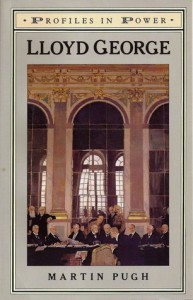The radical centrism of the "Welsh Wizard"

David Lloyd George has never wanted for biographers, yet there is a surprising dearth of first-rate works about him. Both John Grigg and Bentley Birnkerhoff Gilbert attempted multi-volume studies of his life and career, yet both died before they could complete their labors. There are comprehensive single-volume accounts, most notably Peter Rowland's David Lloyd George: A Biography, but Rowland's book suffers from a lack of analysis that would make sense of the details he provides.
Perhaps the greatest challenge that authors who attempt such an effort face is coming to terms with such a long and complicated life. Lloyd George's career can seem to be a mass of contradictions: the pro-Boer who supported Britain's entry into the First World War and who subsequently led the nation to victory, the radical who was prime minister of a Conservative-dominated government, the dynamic Liberal whose tenure as his party's leader saw its decline into political irrelevance. This is the great merit of Martin Pugh's short biography of Lloyd George. In less than 200 pages, he offers an analysis of his subject that reconciles these contradictions into a coherent political career. Pugh's Lloyd George is not so much contradictory as he is complex, with a political philosophy of "radical centrism" that was not at home in either party. Patriotic and reformist, his beliefs were reflected in policies as diverse as his advocacy of old age pensions and his support for imperial expansion, all of which combine to make his legacy a rich one that defined the country more profoundly than most other prime ministers.
Pugh advances his interpretation in clear and forceful prose. Though he confines his citations to published primary sources, it is a book that reflects both his prior archival research and his mastery of the considerable secondary source literature on his subject. Much has been added to this corpus since Pugh's book was first published, yet while it may no longer be up-to-date his analysis has weathered the years well. For anyone seeking to understand this complex and important figure, Pugh's biography is a worthy addition to their reading list.
 3
3






